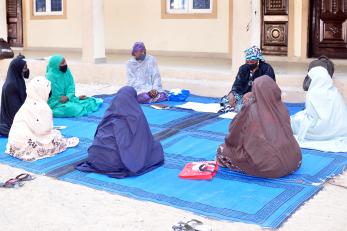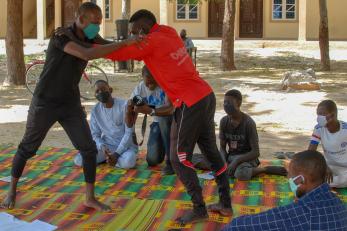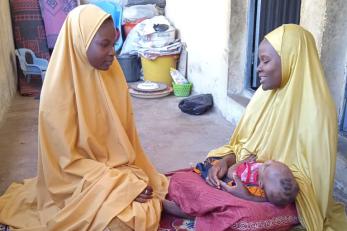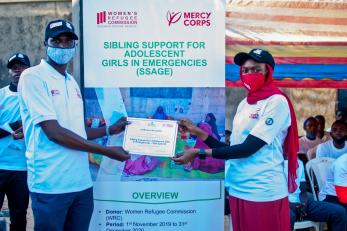Mercy Corps Nigeria pilots Sibling Support on Adolescent Girls Living in Emergencies program

Adolescent girls living in conflict-affected areas in Northeast Nigeria experience unique forms of gender-based violence (GBV) such as early marriage, fear of abduction, sexual violence and forced recruitment by armed militants. They are often traumatized, held back by cultural norms, bearing the burden of domestic labor and lack access to quality education. Without the necessary support from their families and communities they are left behind and unequipped to realize their potential and fully participate in political, economic, and social life.
About the Sibling Support for Adolescent Girls in Emergencies (SSAGE) program
The Sibling Support for Adolescent Girls in Emergencies (SSAGE) program aims to ensure adolescent girls living in humanitarian settings are safer from violence and the threat of violence by engaging their male siblings and caregivers with behavior change communication.
Mercy Corps Nigeria led the implementation of the pilot phase of the SSAGE program that was designed based on the Mercy Corps ‘Hadin Kai’ program, along with new evidence and practice from adolescents and youth development. The Women’s Refugee Commission (WRC) serves as the lead researcher and learning agency on the SSAGE program with support from Washington University in St. Louis, Missouri, USA, to learn from participants about how to improve the program and have it replicated in future adolescent programming.
The program engaged 480 adolescent girls, their older male siblings, and caregivers to participate in a three month safe space program. The safe spaces which were facilitated using a unique curriculum that was designed by an independent consultant - Patrick Welsh with support from Mercy Corps and WRC had different sessions that centered on inter-familial gender norms that put adolescent girls at risk of Gender Based Violence (GBV). The 480 adolescent girls, their male siblings and their caregivers met weekly in safe spaces to discuss these issues.
Creating a safer environment for adolescent girls in emergencies
Despite the challenges of the current pandemic, the program was able to implement, while observing COVID‑19 preventive protocols like social distancing, orientation to all participants and having a strict no-mask, no-participation policy, while providing hand washing stations, face masks and non-contact infrared body thermometers to participants and community volunteers.
The SSAGE program was able to record several successes from the male siblings and caregivers who were able to embrace gender equitable practices and behaviors that support adolescent girls in their families and community.

“I now sweep the compound and fetch water while my sister cooks food and wash the dishes,” shares Adam Mohammed, aged 17, who previously believed that domestic chores were meant for his sister and should be her sole duty, but now knows better. Adam went on to share how his sister now has more time to read and has now improved her grades, moving from eighth to third position in her class. He is now happy to be able to support his sister and see her excel in her studies.
Utilizing the safe space intervention approach, the adolescent girls had a place to meet with their peers, receive psycho-social support, learn life skills and personal hygiene, unlearn limiting gender norms and discuss issues that bothered them.
Many girls reported that their self-esteem has improved thanks to the session. Fatima, aged 14, is one of such girls. She is now able to talk with her parents, elders in her community and peers about issues she previously would not have been able to. This is a huge leap for Fatima who was traumatized from being an internally displaced person and battled low self-esteem as a result and found it hard to make friends.
“I have been able to make good friends through this project. We are able to support each other and positively influence our other peers especially those that have bad tendencies,” Fatima shares.

Adopting an inclusive model, Mercy Corps engaged and trained 20 mentors and coordinators from two communities in Maiduguri Metropolitan Council (MMC), Borno state, to facilitate the safe spaces. Although the program team was initially wary of how it would engage caregivers of the adolescent girls to commit to weekly meetings for the duration of the pilot. The caregivers were impressed with the behavior changes they witnessed in their wards and the knowledge they gained personally and became ambassadors for the project in their communities.
Asabe is a mother who benefitted from the SSAGE project and is now able to effectively communicate with her children, husband, her peers and other members of the community. She consciously made time to discuss and review with her community members about what she was learning from the safe spaces. Also, she meets with the male and female children separately to discuss their issues and how she can better support them.
“I am fortunate to have participated in this program alongside my husband and children and I will share everything I have learned with other women in my community," she says. Asabe has now become a mobilizer of other women around her community by teaching them skills she has gained.
The fathers were not left out, Gambo Hadi Musa participated in the weekly sessions and learned a lot about his responsibilities as a father and how to support and protect his family from GBV. He is even now popularly called ‘Baba Gender’ in his community because of the frequent sensitizations he leads in his community on the need for people to take the issue of gender seriously. “I learned how the responsibility lies on everyone in ensuring our community creates an enabling environment for women and girls to thrive and achieve their full potential,” he says.

A future where adolescent girls are not left behind
The overall aim of the program is to validate a first of its kind sibling based violence prevention intervention model that is gender transformative, including a theory of change and associated curriculum that engages adolescent girls, their older male siblings, and caregivers in a synchronized manner.
The SSAGE program is also going to be implemented in Mercy Corps countries of Jordan and Niger to build upon the findings gained from Borno State, Nigeria to inform future adolescent programming, academic research and other organizations. Mercy Corps continues seeking valuable partnerships such as this one, that can empower and enrich the lives of adolescents especially girls in emergencies and humanitarian contexts.